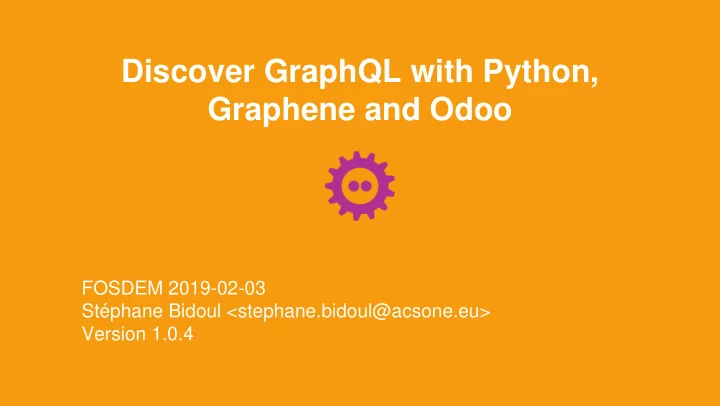

Discover GraphQL with Python, Graphene and Odoo FOSDEM 2019-02-03 Stéphane Bidoul <stephane.bidoul@acsone.eu> Version 1.0.4
A short story • Why this talk… 2 / 47
/me in a nutshell • @sbidoul • CTO of (https://acsone.eu) • Elected Board Member of (https://odoo-community.org) • Python since 1996 (1.4) • FLOSS, because… • Have used a lot of RPC mechanisms 3 / 47
Content • What is GraphQL? • Demo • How to… for Odoo with Graphene • How is GraphQL different? • Caveats and thoughts • Resources • Q&A 4 / 47
What is GraphQL? • Yet another Remote Procedure Call protocol? • Open Sourced by Facebook in 2015 • Basic characteristics • Requests: GraphQL data query language • Responses: json • Schema: GraphQL schema language • Transport: usually HTTPS (GET, POST) • Variety of server side libs, no need for client side lib 5 / 47
Demo GraphQL Schema for Odoo Partners and Contacts. 6 / 47
How to… for Odoo with Graphene import graphene class Country (graphene.ObjectType): code = graphene.String(required=True) name = graphene.String(required=True) 24 / 47
How to… for Odoo with Graphene from odoo.addons.graphql_base import OdooObjectType class Partner (OdooObjectType): name = graphene.String(required=True) street = graphene.String() street2 = graphene.String() city = graphene.String() zip = graphene.String() email = graphene.String() phone = graphene.String() is_company = graphene.Boolean(required=True) # ... 25 / 47
How to… for Odoo with Graphene class Partner (OdooObjectType): # ... country = graphene.Field(Country) @staticmethod def resolve_country(root, info): return root.country_id or None 26 / 47
How to… for Odoo with Graphene class Partner (OdooObjectType): # ... contacts = graphene.List( graphene.NonNull( lambda : Partner), required=True, ) def resolve_contacts(root, info): return root.child_ids 27 / 47
How to… for Odoo with Graphene class Query (graphene.ObjectType): all_partners = graphene.List( graphene.NonNull(Partner), required=True, companies_only=graphene.Boolean(), limit=graphene.Int(), offset=graphene.Int(), ) # ... 28 / 47
How to… for Odoo with Graphene class Query (graphene.ObjectType): # ... def resolve_all_partners( root, info, companies_only=False, limit=limit, offset=offset ): # ... check for max limit domain = [] if companies_only: domain.append(("is_company", "=", True)) ResPartner = info.context["env"]["res.partner"] return ResPartner.search(domain, limit=limit, offset=offset) 29 / 47
How to… for Odoo with Graphene schema = graphene.Schema(query=Query) 30 / 47
How to… for Odoo with Graphene from odoo import http from odoo.addons.graphql_base import GraphQLControllerMixin from ..schema import schema class GraphQLController (http.Controller, GraphQLControllerMixin): @http.route("/graphiql/demo", auth="user") # GraphiQL IDE def graphiql(self, **kwargs): return self._handle_graphiql_request(schema) @http.route("/graphql/demo", auth="user") def graphql(self, **kwargs): return self._handle_graphql_request(schema) 31 / 47
How is GraphQL different? A long ancestry • ASN.1, DCOM, CORBA, SOAP, REST+OpenAPI and many more • Some sort of schema language • Schema is machine readable (eg for automatic message validation) • “On the wire” representation of corresponding messages • Rigid request/response data structures • The service developer interprets and validates the request, does stuff, and prepares the response 32 / 47
How is GraphQL different? What about SQL? • Machine readable schema • “On the wire” message representation is proprietary (database “drivers” instead) • Flexible queries, written by the client developer • There is no service developer, the database does it (stored procedures fall in previous category) 33 / 47
How is GraphQL different? • Client-side freedom of SQL. • Server-side freedom of REST. 34 / 47
Caveats and thoughts: a better REST? • What is REST? • REST + OpenAPI • Crafting a pure REST API is an art that few master • GraphQL breaks HTTP semantics • Little leverage of HTTP infrastructure (caching, firewalls, etc) • With pure REST it’s “easy”, see above • Attention to wild clients, complex queries • As always, it’s a matter of tradeoffs 35 / 47
Caveats and thoughts: Performance Beware of naive implementation of resolvers! DON’T (one database query per returned record): def resolve_contacts(root, info): ResPartner = info.context["env"]["res.partners"] return ResPartner.search([('parent_id', '=', root.id)]) DO (use ORM prefetching strategies): def resolve_contacts(root, info): return root.child_ids 36 / 47
Caveats and thoughts: Façadism • Temptation to expose all your domain model? • Easy with generic GraphQL adapters (Django, SQLAlchemy, …) • It depends on the use case • Often better to create a façade dedicated to the client use cases • Don’t expose your guts and break clients when your domain model changes 37 / 47
Caveats and thoughts: Access Control • With traditional RPC (eg REST), access control is typically done at the façade/service level • GraphQL typically binds at the domain model level • Built-in security in your domain model or data sources? 38 / 47
Key takeaways • GraphQL is easier than it sounds, try it! • Powerful alternative to REST • Very easy to integrate in any Python web application thanks to Graphene • High productivity for backend devs • High flexibility to frontend devs 39 / 47
Resources • Start here • https://graphql.org/learn/ • With Python • https://graphene-python.org/ • Incl. support for different frameworks (eg Django, SQLAlchemy) • With Odoo • https://pypi.org/project/odoo12-addon-graphql-base/ • https://pypi.org/project/odoo12-addon-graphql-demo/ 40 / 47
Questions? @sbidoul stephane.bidoul@acsone.eu
Recommend
More recommend